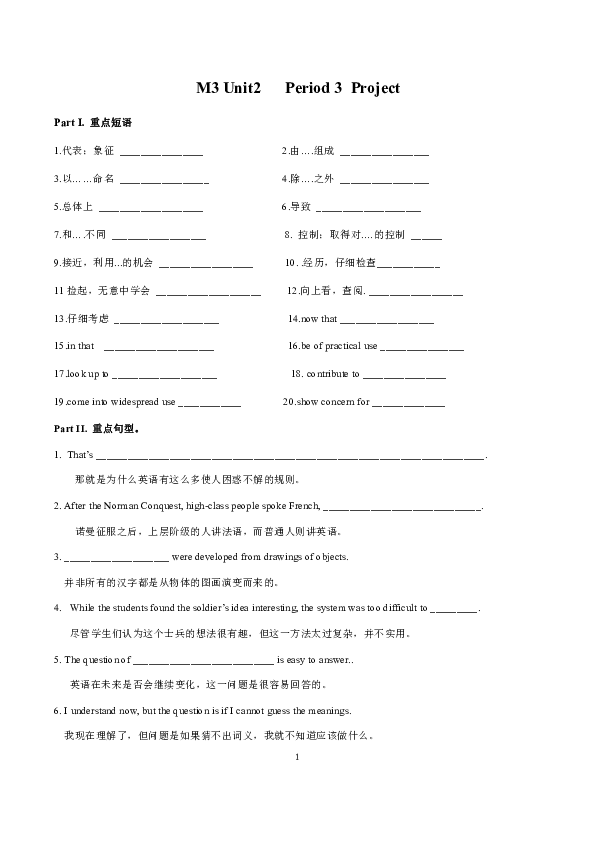
M3 Unit2 Period 3 Project Part I. 重点短语 1.代表;象征 _____ 2.由….组成 _____ 3.以……命名 _____ 4.除….之外 _____ 5.总体上 _____ 6.导致 _____ 7.和….不同 _____ 8. 控制;取得对.…的控制 _____ 9.接近,利用...的机会 _____ 10. .经历,仔细检查_____ 11捡起,无意中学会 _____ 12.向上看,查阅. _____ 13.仔细考虑 _____ 14.now that _____ 15.in that _____ 16.be of practical use _____ 17.look up to _____ 18. contribute to _____ 19.come into widespread use _____ 20.show concern for _____ Part II. 重点句型。 1. That’s _____. 那就是为什么英语有这么多使人困惑不解的规则。 2. After the Norman Conquest, high-class people spoke French, _____. 诺曼征服之后,上层阶级的人讲法语,而普通人则讲英语。 3. _____ were developed from drawings of objects. 并非所有的汉字都是从物体的图画演变而来的。 4. While the students found the soldier’s idea interesting, the system was too difficult to _____. 尽管学生们认为这个士兵的想法很有趣,但这一方法太过复杂,并不实用。 5. The question of _____ is easy to answer.. 英语在未来是否会继续变化,这一问题是很容易回答的。 6. I understand now, but the question is if I cannot guess the meanings. 我现在理解了,但问题是如果猜不出词义,我就不知道应该做什么。 7. The Chinese language differs from Western languages , instead of an alphabet, it uses characters which stand for ideas, objects or deeds. 汉语不同于西方语言,区别在于它不使用字母,而是用汉字表示思想,物体和行为。 Part III. 完形填空 One day, when I was working as a psychologist (心理学家) in England,an boy named David came to my ___1___. He kept walking up and down restlessly, his face pale, and his hands shaking a little. His head teacher had ___2___ him to me. “This boy has ___3___ his family,” he wrote. “He is understandably very sad and ___4___ to talk to others, and I’m very ___5___ about him. Can you help?” I looked at David and showed him to a chair. How could I ___6___ him? There are problems psychology doesn’t have the answer to, and which no words can describe. Sometimes the best thing one can do is to listen openly and sympathetically (同情地). The first two times we ___7___, David didn’t say a word. He sat there, only looking ___8___ to look at the children’s drawings on the wall behind me. I suggested we play a ___9___ of chess. He nodded. After that he played chess with me every Wednesday afternoon—___10___ complete silence and without looking at me. It’s not easy to cheat in ___11___, but I admit I made sure David won once or twice. Usually, he arrived earlier than agreed, took the chess board and pieces from the shelf and began setting them up ___12___ I even got a chance to sit down. It seemed as if he ___13___the game and my company. But why did he never look at me? “Perhaps he simply needs someone to share his ___14___ with,” I thought. “Perhaps he senses that I respect (尊重) his suffering. “Some months later, when we were playing chess, he looked up at me ___15___. “It’s your turn,” he said. After that day, David started ___16___. He got friends in scho ... ...
~~ 您好,已阅读到文档的结尾了 ~~

